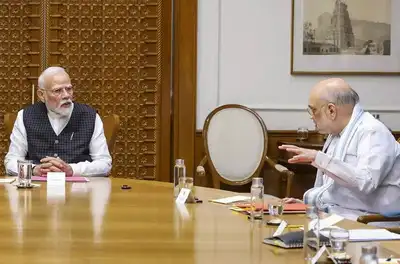Following a devastating terrorist attack in Pahalgam, Jammu and Kashmir, that left 26 civilians dead, the Indian government has taken a series of tough steps to make Pakistan pay for its suspected role in fomenting cross-border terrorism. The Cabinet Committee on Security (CCS), led by Prime Minister Narendra Modi, met to consider the situation and took five major decisions to retaliate against the attack and bolster national security.
1. Suspension of the Indus Water Treaty
India has suspended the Indus Water Treaty, which India and Pakistan signed in 1960 to govern the utilization of water from the Indus River system. The treaty, which has been the keystone of India-Pakistan relations for more than six decades, granted Pakistan access to the waters of the Indus and its tributaries.
The suspension is a reaction to the ongoing use of Pakistan’s soil by terrorists targeting Indian civilians and security personnel. Indian officials have said that Pakistan’s inability to take serious action against terrorism has left India with no alternative but to resort to this extreme measure. The suspension of the treaty is likely to have a severe effect on Pakistan since it depends significantly on the Indus system’s water resources for its agriculture, industry, and electricity generation.
The government of India has clarified that the move will continue to be in force until Pakistan makes tangible steps in order to cease its help to terror groups for India.
2. Closure of the Attari-Wagah Border
Another major step is the closure of the Attari-Wagah border, the main land crossing between India and Pakistan. The border is not only used as a crossing point for individuals but also as a crucial route for trade between the two nations.
The Indian government declared that the closure would be permanent, stopping all people and goods movement across the border. The measure affects not only Pakistani nationals but also Indian citizens, who often use the border for trade, visits, and cultural contacts. Closure of the border will have a significant economic effect, particularly on enterprises and industries that make use of trade between the two countries.
Additionally, the Indian government has given Pakistani nationals who are in India a deadline to go back to Pakistan by May 1, 2025. This action is interpreted as a clear message to Pakistan that India will not accept cross-border terrorism and will take strong measures to provide security to its citizens.
3. Revocation of SAARC Visa Exemption Scheme
India has also announced the cancellation of the South Asian Association for Regional Cooperation (SAARC) visa exemption scheme for Pakistani citizens. The scheme earlier used to grant Pakistani citizens a visa to travel to India for different reasons like tourism, medical treatment, and business with special privileges.
According to the new directive, all visas issued under this arrangement have been revoked, and Pakistani nationals who were in India on this basis have been asked to leave the country within a hard 48-hour deadline. This action is an unmistakable message that India will not accept Pakistan’s behavior and will do whatever it takes to safeguard its sovereignty and national security.
4. Expulsion of Pakistani Defense Advisors
In a step further increasing tensions between the two countries, India has announced the Pakistani High Commission Defense, Military, Naval, and Air Advisors in New Delhi to be persona non grata. The Pakistani representatives have been offered one week for their departure from India.
In response, India also chose to withdraw its own military and defense advisors from the Indian High Commission in Islamabad, an end to any immediate military coordination between the two nations. This diplomatic measure is considered a clear warning against Pakistan’s role in entertaining terrorists and abetting militant action against India.
5. Increased Alertness and Ongoing Seek for Justice
Last but not least, the Indian government has directed every security agency to be on high alert throughout the nation. The government has reaffirmed its determination that the culprits behind the Pahalgam attack will be brought to justice, and Pakistan will be made accountable for its role in allowing such terror activities.
India has reiterated its intention of undertaking every effort possible to secure its citizens against terrorism. India has stressed that it will continue to pursue the perpetrators of the Pahalgam attack, including internationally and legally.
Regional and Global Implications
India’s choices following the Pahalgam attack will be likely to influence the entire region considerably. India’s revocation of the Indus Water Treaty and shutdown of the Attari-Wagah border will also be likely to put even greater pressure on India-Pakistan relations. They might also impact other nations within the region, especially those countries involved in commerce or diplomatic activities with India and Pakistan.
Although Pakistan has not acknowledged any role in the attack and has complained about India’s actions, the Indian government is firm in its position. It has reasserted that the actions are necessary in order to secure Indian citizens and for national security.
India’s firm response to the Pahalgam terror attack sends a clear message to Pakistan regarding the need to own up to terrorism emanating from its territory. Suspension of the Indus Water Treaty, shutting down of the Attari border, withdrawal of the SAARC visa exemption scheme, expulsion of Pakistani defense officials, and increased vigilance all are a reflection of India’s determination in protecting its national interests.
With tensions between the two nations increasing, the world will be keeping its fingers crossed that the situation eases and there is a return to peace. But for now, India’s actions suggest that it will not hesitate to take firm action in defending its sovereignty and safeguarding the lives of its citizens.






